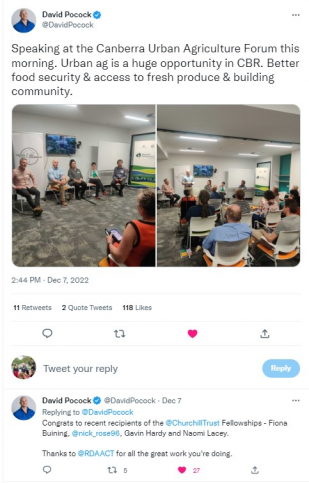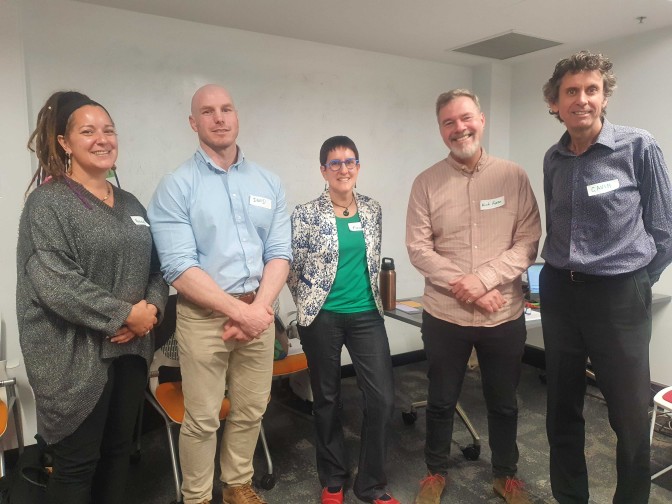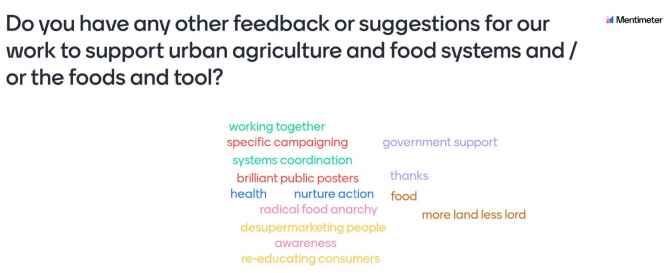Canberra Urban Agriculture Forum 2022 Wrap Up
Nick Rose, Executive Director, SustainOur Canberra Urban Agriculture Forum happened on December 7th, 2022, Sustain's wrap-up event for National Urban Agriculture Month, held during November.
45 practitioners, ACT government staff and organisational leaders gathered into the cosy meeting room in Griffith for this historic event.
It was standing room only during the first session, with passionate presentations from Churchill Fellows: Naomi Lacey, President, Community Gardens Australia; Fiona Buining, Proprietor, Ainslie Urban Farm; Gavin Hardy, Queensland Coordinator, Community Gardens Australia and Nick Rose, Executive Director, Sustain: The Australian Food Network.
These presentations followed opening remarks from Michael Claessens, CEO of Regional Development Australia ACT, who set the scene regarding the challenges and huge opportunities for the urban agriculture sector in the ACT.
All eyes were on David Pocock, Independent Senator for the ACT, as he gave his response to the Churchill Fellows and Michael Claessens.

David spoke of the importance of the shift towards regenerative agriculture and the need for greater food sovereignty in Australia.
He told the room it was vital to make the connection between agriculture, food, mental health and community building.
He endorsed the key messages of the Churchill Fellows, all of whom called for substantial government investment and policy support for regenerative urban agriculture as part of the transition to healthy, fair and sustainable cities and towns.

David’s comments were followed by half an hour of vigorous questions and discussion, with themes including the need to mainstream urban agriculture and secure its recognition; and support in planning and urban design frameworks.
After a brief morning tea, participants split into two groups for a workshop, one on practical models and supports for urban agriculture with a focus on farmer training and agroforestry supports; and the other on policy and governance frameworks.
Answering the question, "What would help get more urban agriculture happening?", participants shared the following ideas:
- Communications / awareness and education campaign about what is healthy food - advertising link between food and health / counter McDonald’s effect;
- Communications and education about what is urban agriculture;
- Education on how urban agriculture produces healthy food;
- A food forest education program;
- More networking between groups & organisations;
- Funding - government funding as an investment, not a subsidy;
- Establishing a land access office.
In the Policy and Governance discussion, participants noted that the ACT Food & Fibre Strategy is being finalised by the end of January 2023 and then going out for further publication consultation. This builds on the work done in 2021, with over 1000 people engaged in the consultation process.
The Strategy’s broad vision is: 'ensure the ACT region is securing local food sustainably, promoting universal access to healthy food'.
One participant noted how there can be a misalignment in terms of objectives and implementation:
“The Devil is in the detail - the objectives stated in the Strategy [may not] be reflected in the implementation plans or technical standards, e.g. to enable agroforestry, community gardens. We have to make sure this doesn’t happen.”
Participants noted that this presented an opportunity to engage in advocacy with peak bodies, urban planning consultants, developers and landscape architects, with general agreement that the role of developers is key.
The concepts of collaboration and networking came up as a common theme, with one participant noting:
“What we’re talking about is social process - not just technical matters or business models. So there is a need for greater networking and collaboration – and a need to engage with other sectors – e.g. health, education, planners etc.”
The opportunity exists for a whole-of-system conversation and collaboration.
Participants also brainstormed the following ideas:
- Easier access to parks and open space to grow food;
- Access to schools to grow food;
- Secure tenure of land for farmers;
- Combine community gardens with social housing;
- Incorporating community gardening to every residential development;
- Appropriate legislation, taxation and subsidies that allows for small-scale farming;
- Community composting;
- Make urban agriculture food supply more convenient for consumers, e.g. through CSAs.

Everyone agreed the first Urban Agriculture Forum in the nation’s capital was a big success –and we can’t wait for the next one in 2023!